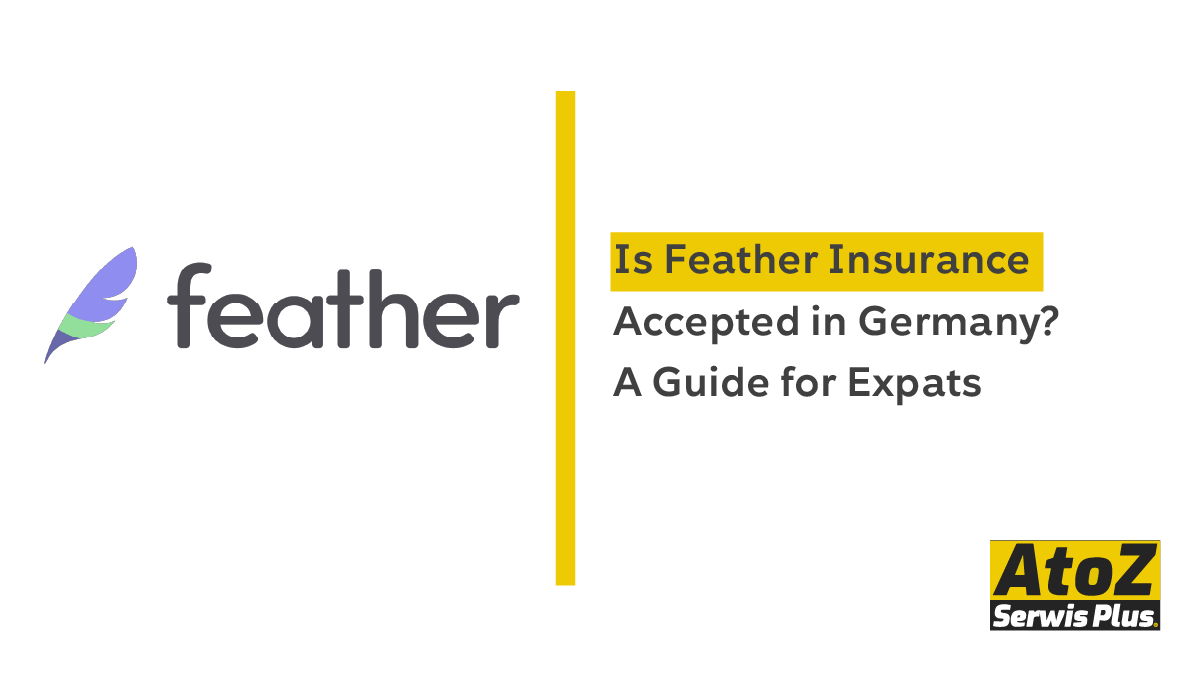

Is Feather Insurance Accepted in Germany? A Guide for Expats
If you’re moving to Germany, one of the first things you’ll discover is that health insurance is mandatory. Whether you’re here for work, study, or a new life chapter, you must prove you have valid Coverage to get a visa, residence permit, or university admission. For many expats, understanding the German system with its public (GKV) and private (PKV) options can be overwhelming. That’s where Feather Insurance comes in — a modern, digital provider explicitly built for expats to make insurance in Germany simple, fast, and stress-free.
What Is Feather Insurance?
Feather is a digital-first insurance provider based in Germany, designed to help expats navigate the complex world of German insurance. Everything from application to policy management happens online in English, making it ideal for newcomers who may not yet speak German. Feather focuses on clarity, transparency, and convenience.
Is Feather Insurance Legally Accepted in Germany?
Yes, Feather Insurance is officially accepted in Germany and recognised by immigration offices, visa authorities, and universities. Many expats use Feather health insurance to apply for their residence permit or student visa. It meets the legal requirements for temporary Coverage while you are settling in Germany.
Who Can Apply for Feather Insurance?
Feather is an excellent option for:
- New arrivals who don’t yet qualify for public insurance.
- Students beginning a university program in Germany.
- Freelancers or self-employed people who want flexible Coverage.
- Short-term residents who need insurance that’s legally accepted by authorities.
Types of Insurance Offered by Feather
Feather offers expat health insurance (temporary Coverage up to 5 years), public health insurance (through providers like TK, AOK, DAK, and BARMER), and private health insurance for eligible individuals.
Personal liability insurance is one of the most essential optional policies in Germany. Feather offers this Coverage to protect against damages you might accidentally cause to another person or their property.
Since public health funds cover only basic treatments, Feather offers supplementary dental plans that include cleanings, fillings, implants, and orthodontics.
Worldwide medical coverage that protects you against unexpected healthcare costs while travelling abroad.
Tailored plans for cats and dogs, covering veterinary bills, operations, and treatments.
Insurance Options in Germany – Comparison Table
|
Insurance Type |
Description |
Key Features / Benefits |
More Info |
|---|---|---|---|
|
Health Insurance Comparison |
Health coverage is legally required in Germany. Three tiers available: public, private, and expat. |
Costs, eligibility, and Coverage differ by plan. |
|
|
BARMER Public Health Insurance |
One of Germany’s largest public providers with 9M+ members. |
High-quality care, innovative services. |
|
|
TK Public Health Insurance |
Leading public insurer with excellent Coverage. |
Fast confirmation, English support. |
|
|
AOK Public Health Insurance |
One of the oldest providers in Germany. |
Cashback for check-ups, extra cancer & dental Coverage. |
|
|
DAK Public Health Insurance |
Focus on prevention and healthy lifestyles. |
Rewards program, dental and vaccination coverage. |
|
|
BKK Firmus Public Health Insurance |
Regional public health provider. |
Info coming soon. |
|
|
Expat Health Insurance |
For newcomers in Germany, up to 5 years. |
Accepted for a visa, with flexible cancellation and the option to switch to public. |
|
|
Public Health Insurance (General) |
Standard insurance for most salaried workers. |
Covers pre-existing conditions and dependent family members. |
|
|
Private Health Insurance |
For high earners and self-employed. |
Often, cheaper, faster access to specialists. |
|
|
Dental Insurance |
Supplemental public Coverage. |
Covers cleanings, fillings, and replacements. |
|
|
Life Insurance |
Provides financial protection for family and partners in the event of death. |
Flexible Coverage for dependents. |
|
|
Disability Insurance |
Protects income if unable to work. |
Covers illness, accidents, and burnout. |
|
|
Dog Liability Insurance |
Required in some regions. |
Covers damages caused by pets. |
|
|
Personal Liability Insurance |
Protects against accidental damage to others. |
Very affordable (~approximately 4$44er per month). |
|
|
Household Contents Insurance |
Covers items in your home. |
Protection from fire, theft, and water damage. |
|
|
Bike Insurance |
Covers bikes against theft & damage. |
No “night-time clause,” broad Coverage. |
|
|
Legal Insurance |
Covers legal costs in disputes. |
Free lawyer consultations included. |
|
|
Pet Health Insurance |
Covers vet expenses for cats and dogs. |
Flexible plans, quality healthcare access. |
|
|
Pension Insurance |
Personal retirement savings plan. |
Flexible contributions, no upfront fees. |
|
|
Travel Insurance |
Worldwide Coverage outside Germany. |
Protects against costly medical expenses. |
|
|
Recommendation Tool |
Helps identify needsPersonaliseded |
Personalised suggestions based on lifestyle. |
Public vs. Private Health Insurance in Germany – Comparison
|
Feature |
Public Health Insurance (GKV) |
Private Health Insurance (PKV) |
|---|---|---|
|
Eligibility |
Employees earning below €66,600/year, students, unemployed, pensioners |
Employees earning above €66,600/year, freelancers, self-employed, and civil servants |
|
Costs |
Income-based (approx. 14–15% of salary); family included at no extra cost |
Risk-based (depends on age, health, Coverage); each family member needs a separate policy. polStandardized |
|
|
Standardised overage across providers (doctor visits, hospital stays, maternity, etc.). |
CuCustomizable packages, often more comprehensive (private rooms, alternative medicine, faster appointments) |
|
Family Coverage |
Free for dependents (spouse and children without income) |
No free family coverage – separate policies required for each member |
|
Access to Doctors |
Wide access to doctors and hospitals, but sometimes longer waiting times |
Often faster access to specialists and shorter waiting times |
|
Pre-existing Conditions |
Fully covered, no exclusions |
May increase premiums or exclude certain conditions |
|
Retirement |
Coverage continues in retirement, contributions based on pension income |
Premiums continue in retirement, and can become expensive without planning |
|
Switching |
Easier to switch between public insurers |
Harder to return to public once enrolled in private (exceptions for income drop or unemployment) |
|
Additional Benefits |
Preventive care, vaccinations, basic dental, and maternity benefits |
Enhanced benefits like private hospital rooms, extensive dental, and alternative therapies |
|
Best For |
Employees under the threshold, students, families, and retirees |
High earners, young healthy individuals, freelancers, and civil servants |
Feather Insurance vs. Public Health Insurance (GKV)
- Public Health Insurance (GKV): Contributions are based on your income, and dependents are included for free. Coverage is broad and subject to regulation by law.
- Feather: More flexible for expats, easier to apply for, and fully digital. It’s beneficial if you’re new in Germany and not yet eligible for GKV.
Feather Insurance vs. Private Health Insurance (PKV)
- Private Health Insurance (PKV): Available for high earners and freelancers, premiums vary based on health and age, often offering faster access to doctor appointments.
- Feather: More affordable, transparent, and simpler to manage. Ideal for newcomers, students, and short-term expats before switching to PKV.
Benefits of Choosing Feather Insurance as an Expat
- Accepted by immigration and visa authorities.
- Easy online sign-up and management.
- Transparent pricing with no hidden costs.
- English-speaking support team.
- Coverage tailored for expats, students, and freelancers.
- Ability to switch to public or private insurance later.
Limitations and Things to Consider Before Applying
- Expat health insurance is typically limited to a 5-year term.
- Long-term residents may need to transfer to public or private health insurance.
- Coverage may not include every specialised treatment.
- Family members require their own Coverage, as Feather does not bundle dependents like public insurance.
How to Apply for Feather Insurance in Germany
Applying is straightforward:
- Go to the Feather website.
- Select your insurance type (e.g., health, liability, dental).
- Please complete the online form with your personal and visa details.
- Upload the necessary documents, such as your passport or university admission letter.
- Receive confirmation quickly, often within 24 hours.
Feather Insurance Reviews and Expat Experiences
Many expats highlight:
- A fast and straightforward process compared to traditional insurers.
- Clear communication in English.
- Smooth acceptance for visas and residence permits.
Some note that while Feather is perfect for the first years, switching to GKV or PKV later may be necessary for long-term stays.
Conclusion: Should You Choose Feather Insurance in Germany?
Feather is an excellent choice for expats seeking straightforward, legal, and flexible insurance in Germany. Authorities trust it, it offers easy online management, and caters to the needs of students, freelancers, and new arrivals. However, if you plan to live in Germany long-term, you should eventually transition into public or private health insurance.
FAQs About Feather Insurance in Germany
1. Is Feather Insurance accepted by German embassies for visa applications?
Yes, Feather health insurance is accepted by German embassies and immigration offices as valid Coverage for visas.
2. How long can I stay on Feather expat health insurance?
Expat health insurance through Feather is valid for up to five years.
3. Can I switch from Feather to public health insurance?
Yes, once you have a full-time job or meet the requirements, you can transfer to a public health insurer, such as TK or AOK.
4. Is Feather cheaper than public health insurance?
For many students and young expats, Feather is more affordable compared to public insurance. Costs depend on age, Coverage, and visa type.
5. Does Feather insurance cover dental treatments?
Yes, but you need to add supplementary dental insurance to cover advanced treatment, such as implants and orthodontics.
6. Is Feather better than private health insurance?
Feather is simpler and more affordable for expats starting, while private health insurance may be better suited for long-term residents or high earners.
7. Can families use Feather insurance?
Yes, but each family member needs their own policy, as Feather doesn’t automatically cover dependents like GKV.
8. Does Feather provide liability insurance?
Yes, Feather offers personal liability insurance — one of the most essential optional policies in Germany.
9. Is Feather insurance available in English?
Yes, all services, contracts, and customer support are available in English, which is why it’s popular with expats.
10. How quickly can I get covered with Feather?
In most cases, you’ll receive confirmation within 24 hours, making it one of the fastest options for new arrivals.


















